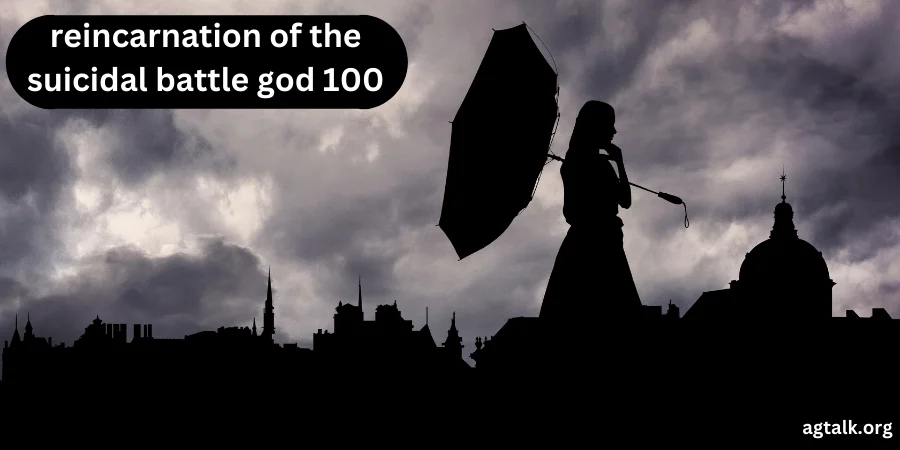Reincarnation of the suicidal battle god 100: A Saga of Redemption
Readers are drawn in by “Reincarnation of the suicidal battle god 100” because of its distinctive fusion of action, mythology, and profound psychological concepts. This story chronicles the resurrection of a powerful warrior who, at one point, battled suicidal thoughts and his search for atonement in a brand-new existence. Character-driven adventure and epic story fans will like the story’s complex structure, which is mostly made up of cultural and mythical elements.
What is Reincarnation of the suicidal battle god 100?
In the gripping tale “Reincarnation of the suicidal battle god 100,” a once-powerful warrior who gave in to his inner demons is given the chance to make amends in his next life. Because it expertly blends elements of fantasy, action, and in-depth psychological study, the story stands out in its genre. The themes of self-discovery, atonement, and the persistent pursuit of a just cause are central to the narrative.
The Battle God’s Legend and Mythology
The Battle God is a mythical character from ancient mythology who is admired for both his terrible death and his unparalleled fighting skills. In the past, he represented the qualities of bravery and selflessness and was a ray of hope during times of conflict. His legendary status is inscribed in history as a warning against the dangers of unbridled grief and excessive power.
The Concept of Reincarnation of the suicidal battle god 100
A fundamental tenet of many spiritual traditions is reincarnation, or the idea that the soul reincarnates into a different body after death. In this tale, reincarnation serves as the Battle God’s opportunity to face his previous transgressions and pursue atonement in addition to being a cycle of rebirth. It gives the story more complexity as the main character struggles with flashbacks to his past while adjusting to the difficulties of his current life.
The Suicidal Element
A sobering reminder of the protagonist’s previous hopelessness is the word “suicidal” in the title. This component provides the narrative with a deep psychological depth by emphasizing the hero’s battle with his own demons. It is not just a plot device; rather, it is an essential part of his character development as he struggles with both internal conflict and external enemies.
The Protagonist’s Journey
The Battle God was a fierce warrior whose existence was characterized by never-ending conflict and suffering before his rebirth. His cruel demise resulted from his ultimate surrender to hopelessness. He is thrown into a new world with flashbacks to his former existence upon rebirth, where he must overcome the regrets from his past life while simultaneously using his incredible abilities.
The Transformation After Reincarnation
The protagonist undergoes a significant metamorphosis in the reincarnation of the suicidal battle god. His newfound powers, unattainable in his previous existence, grant him a second start at life along with a new body. Not only has he undergone bodily change, but he has also undergone mental change as a result of his desire to protect the people he loves and make up for his past.
Key Characters in the Story
A wide variety of individuals, each essential to the protagonist’s quest, are included in the novel. Adversaries constantly test him, while allies, like devoted friends and knowledgeable mentors, offer advice and assistance. Each of these individuals plays a vital role in the development of the protagonist and the story’s progression, and they are all deftly integrated into the story.
The Battle God’s New Mission
The Battle God has been reborn with a renewed sense of purpose, and his main goal is to stop the catastrophes of his past from happening again. He must overcome both old and new foes on this treacherous mission. His quest is one of atonement as he looks to right the wrongs and find solace for his tormented spirit.
Themes of Atonement and Retaliation
The tale progresses due to its fundamental themes of redemption and retribution. As he works to make amends for his past transgressions, the protagonist’s journey is one of atonement. He struggles with the urge for vengeance against those who have mistreated him at the same time, which leads to a complicated emotional interaction that gives the narrative depth.
Action and Combat Sequences
Enthralling action and combat scenes that highlight the protagonist’s extraordinary abilities are interspersed throughout the narrative. These conflicts put his cunning and resolve to the test and are not only physical fights. Every battle he puts up is evidence of his development, showing how he changed from a troubled person to a fierce fighter.
Depth in Emotion and Psychology
The story explores the protagonist’s emotional and psychological state in great detail. His character is further complicated by the internal issues he harbors from his previous existence. The novel is not only an epic adventure but also a profound psychological investigation as readers are carried on a journey of self-discovery and healing as he faces his anxieties and insecurities.
World-Building and Setting
The narrative heavily relies on the intricately described universe that the story is set in. The protagonist’s trip is vividly framed by the different landscapes, which range from busy cities to ancient ruins. Meticulous world-building ensures that every location shapes the experiences of the characters and influences the events.
Magnificent Times
There are numerous climactic moments in the story that operate as narrative turning points. In these crucial moments, the main character confronts his biggest obstacles and makes choices that will ultimately determine his course. Every climax advances the narrative toward a gratifying and memorable resolution.
FAQs about reincarnation of the suicidal battle god 100
1. What inspired the creation of Reincarnation of the suicidal battle god 100?
The story draws inspiration from various mythologies and the universal themes of redemption and second chances.
2. Is the Battle God based on a real mythological figure?
While the Battle God is a fictional character, his traits and story arc are influenced by various mythological heroes.
3. What makes the protagonist’s journey unique?
The protagonist’s struggle with his past life’s regrets and his quest for redemption in a new world add a unique psychological depth to his journey.
4. Are there sequels or related works to this story?
As of now, there are no direct sequels, but the rich world and characters offer plenty of potential for future stories.
5. Who would enjoy reading this story?
Fans of fantasy, mythology, and character-driven narratives with deep psychological themes would find this story particularly engaging.
6. Who is the protagonist of Reincarnation of the Suicidal Battle God 100?
The protagonist is the Suicidal Battle God, a complex figure seeking redemption across multiple lifetimes.
Conclusion
The epic tale “Reincarnation of the suicidal battle god 100” blends mythology, action, and deep psychological concerns. Because it explores themes like rebirth, atonement, and the battle against inner demons, the novel is captivating to read. It pushes readers to think critically about mortality, the purpose of life, and the possibility of second chances.
Share this content:














Post Comment